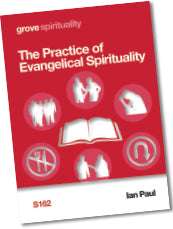Ian Paul on practising evangelical spirituality

Ian Paul, The Practice of Evangelical Spirituality, Grove Spirituality series 162
Cambridge: Grove Books, 2022; ISSN 0262-799X; £3.95
Available in print or e-book format from Grove Books website here
I’ve read this recent booklet (28 pages) by Ian Paul with appreciation. He brings together lots of thinking about the kind of spirituality evangelical Christians practise (particularly in the UK), with a view to helping such people grow and expand in their practise of spirituality. In doing so he draws on a number of classic treatments of the topic (among recent authors, David Bebbington, Derek Tidball, Eugene Peterson, David Gillett, Ian Randall, John Tiller, Philip Seddon, Pete Greig and Peter Adam are all cited), and organises his discussion around five themes: Changing (the need for conversion), Gathering (meeting together as God’s church), Reading (the central place of Scripture), Praying and Fasting, and Sharing and Serving (engaging with a lost world). He rightly rejects the false distinction between the inner and outer life, between contemplation and activism, which sadly characterises much of the Christian world, although he does not go so far as to define his key term, ‘spirituality’, which is a pity.
The five core chapters are clear, lucid and well written. Ian regularly points us back to the roots of evangelical thinking and practice in Scripture and in our predecessors (e.g. the Wesleys, Charles Simeon, John Wycliffe), highlighting that we live today as part of a stream of Christian faith which goes back through history. He also gives personal examples of his own discovery and growth in spirituality from time to time, and these helpfully ‘earth’ his ideas. Each chapter ends with questions for reflection, and these would help individuals reading the booklet personalise each chapter, and would also be very useful if a small group read and discussed this booklet.
Here are a few things which particularly struck me in reading. First, Ian holds together, as most British (and many other) evangelicals do, the need for evangelism and social engagement (chapter 6)—a contrast with the polar opposition of these two activities in other parts of the world. Secondly, his emphasis on fasting does not reflect my experience of Anglican evangelicalism during my lifetime, and that’s a pity and a challenge, since Ian shows how that practice is rooted in Scripture and history (John Wesley expected his preachers to fast on Wednesday and Friday each week). Thirdly, as a biblical scholar, I appreciated Ian’s emphasis on three ways of engaging with Scripture (based on Jim Packer): the Spirit’s work in authenticating what we read as God’s word; the Spirit’s work in illuminating our minds as we read; and the Spirit’s work through our hard work of ‘exegesis, analysis, synthesis and application’ (p 17, quoting Packer). Fourthly, I was delighted to read Ian’s emphasis on holy communion as an important feature, and this as part of the ‘mystical’ strand of evangelical spirituality, rather than an over-rationalistic approach. The strength of evangelicalism (at least, in the Church of England) has often been among those with university education, and that has inadvertently promoted the place of the mind in the Christian life at the expense of more affective response to God.
The one thing I’d have liked in this is a brief annotated list for further reading at the end, but the compass of a Grove booklet may have excluded that. Those who follow up the endnotes will certainly find lots to take their thinking—and practice—further.
Warmly recommended.
